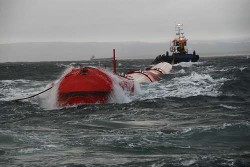Energy minister keen on reducing transmission charges for island renewables

The UK government is looking to speed up moves to cut the high electricity transmission charges faced by renewable energy generators in the Scottish islands, like Viking Energy.
Chris Huhne said he had instructed the department of energy and climate change to look closely at whether there is a case for adjusting the Energy Act 2004. Action now would put the government in a position to act quickly to change the law if a cut in charges is agreed by the electricity regulator Ofgem from its current review of the UK’s charging system.
The outcome of Ofgem’s Project TransmiT review is eagerly awaited by Viking Energy and it expects to hear its findings by late summer. The cost of sending power to market from the Highlands and Islands has already put some renewables developers off and a significant lowering of costs could have a major impact on the profitability of the Viking windfarm and other potential developments in Shetland, such as the Aegir wave farm.
There has been considerable pressure on Ofgem and the UK government to stop penalising the very places which can deliver the most renewable energy, including from the Scottish government. Currently producers have to pay “locational” transmission charges based on the distance between where power is generated and used.
Generators in the north of Scotland face the highest charges in the UK of around £21.58 per kiloWatt hour whereas in London a power provider gets a subsidy of £6.9 per kWh, according to government figures.
Speaking this week to the Scottish Renewables conference in Glasgow via an erratic videolink, Mr Huhne amplified the UK government’s commitment to renewables as a foundation of Britain’s energy system.
The minister said the UK had to go from being “the dunce in the class” as 25th out of the 27 EU member states for the amount of renewable energy generation to become Europe’s fastest improving pupil via a five-fold increase in the deployment of renewables. The UK target is to have 20 per cent of its energy from renewables by 2020 whereas the Scottish target is 80 per cent of electricity by 2020.
Mr Huhne told delegates: “Government must break through the barriers that are stopping new schemes being built; overcoming the financial, planning and delivery hurdles that can hold up progress on renewables.
“If our renewable industry is to flourish, we need to get the infrastructure right, making it easier for renewable projects to plug in to the grid.
“We have to make sure that the right transmission charging regime is in place to meet the challenges of renewable generation throughout Scotland. I know developers have real concerns about the current level of forecast transmission charges – particularly in the Scottish Islands, where major projects are on hold.
“I also know Ofgem recognise these concerns and like you I await their review of the transmission charging arrangements through Project TransmiT. The key thing is to deliver a simple, fair and predictable charging regime that recognises our new energy landscape. Our purpose is not to build plant near consumers, but to wire up plant wherever the wind blows and the tides run.
“I’m not going to prejudge Ofgem’s review. But I have asked my officials to look closely at whether there’s a case for adjusting transmission charges for renewable generation on the Scottish Islands under section 185 of the Energy Act 2004 – so we can act quickly if we need to.”
Viking project manager Aaron Priest, who attended the conference, said the minister’s speech was “very welcome and upbeat”. “It’s good to get a specific mention of the initiative on islands that has already been under way for some time. We are participating fully in that process of re-examining charge-capping powers.”
Isles MP Alistair Carmichael said: “The renewable energy sector in the Northern Isles has enormous potential but it has been clear for some time that the current transmission charging regime has put many companies off from investing in the industry.
“As the secretary of state made clear during his most recent visit to the Northern Isles, he is well aware of the difficulties that the high charges have caused locally.
“I have long been of the view that what we need to see is a straightforward, fair and predictable charging regime that will facilitate development, not block innovation. The announcement that officials are now assessing formally the case for a cut in charges for the Scottish Islands is good news indeed.”




NO COMMENTS
Add Your Comment